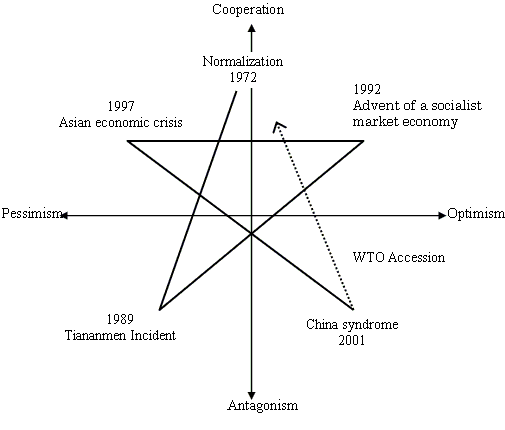The year 2002 marked the 30th anniversary of normalization of ties between Japan and China. Over these thirty years, we can see that the Japanese view of China has changed greatly. Let me trace these changes based on two axes - whether Japanese public opinion views China's future with optimism or with pessimism, and whether it is antagonistic because China is perceived as a threat, or whether it is cooperative because it is seen as a partner ( diagram ).
Diagram : Japan's Changing view of China

Normalization of diplomatic relations was realized in 1972 when the Japan-China Joint Communiqué was announced by then Japanese Prime Minister Kakuei Tanaka and Chinese Prime Minister Zhou Enlai. Friendship between the two nations deepened, as was seen with the presentation of giant pandas to Japan by the Chinese government and mutual visits by leaders. Then, in line with the joint communiqué, the Japan-China Treaty of Peace and Friendship was signed six years later in 1978. However, this amicable mood took a turn for the worse with the Tiananmen Incident of 1989. The Japanese public began to take a pessimistic view of China's future, believing that potential seeds of political and social instability, such as human rights issues and slow democratization, would eventually bring economic development to a standstill. At the same time, Japan took a more antagonistic approach in line with the position of the United States, which imposed economic sanctions on China, demanding that it improve its human rights record and speed up the democratization process. However, when reforms and market opening policies were accelerated in 1992 with the speeches Deng Xiaoping gave during his tour of southern China, the majority of Japanese came to hold the optimistic view that the advent of a socialist market economy would make brisk economic growth possible. This was coupled with a cooperative attitude, as was seen with the increase in investment by Japanese companies that saw promising business opportunities in China.
However, this perception changed dramatically with the Asian financial crisis of 1997. Fears about the risk of the yuan's devaluation and the collapse in 1998 of the Guangdong International Trust and Investment Corporation led to the rise in pessimism that the financial crisis would only worsen. Japan responded by proposing financial cooperation among Asian countries that included China as a key player. But once such economic fears receded and China continued on its path of robust economic growth, we began to see in 2001 the rise of the perception that China was in fact a threat to Japan. This "China syndrome," as I call it, was also fueled by the protracted downturn of the domestic economy and the subsequent loss of confidence on the part of the Japanese. In other words, even though Japan felt optimistic about the future of the Chinese economy, it took an antagonistic approach toward China, as was seen in the application of safeguard import restrictions, out of concerns that jobs would be lost and that domestic industry would experience a hollowing-out.
China has continued to enjoy solid growth and the optimistic attitude toward its economy is still prevalent in Japan. But it is only recently that we are finally beginning to see indications at the corporate level of moves to make better use of China's dynamism. This trend springs from expectations that China's entry into the World Trade Organization will improve its market environment and turn it from the "world's factory" to a "global market." At the government level, also, officials are groping with the idea of a free trade agreement that encompasses all of East Asia, including China.
As this shows, Japan's perception of China has continued to change and has been far from consistent. Although 30 years have passed since these two nations established diplomatic ties, I wonder whether it will be possible to truly deepen bilateral friendship any time soon without a calm assessment of China's realities.


